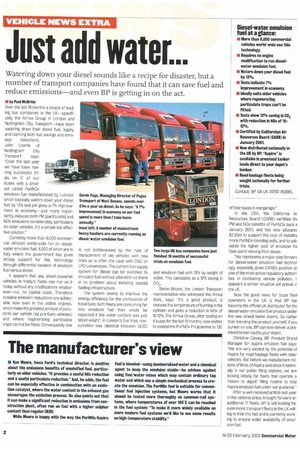Just add water...
Page 12

If you've noticed an error in this article please click here to report it so we can fix it.
Watering down your diesel sounds like a recipe for disaster, but a number of transport companies have found that it can save fuel and reduce emissions—and even BP is getting in on the act.
• by Paul McBride Over the fast 18 months a couple of leading bus companies in the UK—specifically the Arrive Group in London and Nottingham City Transport—have been watering down their diesel fuel, legally, and claiming both fuel savings and emis sion reductions. John Lowrie of Nottingham City Transport says: "Over the last year we have been running successful trials on 17 of our buses with a product called PuriN0x emulsion fuel manufactured by Lubrizol which basically waters down your diesel fuel by 13% and yet gives a 7% improvement in economy—and more importantly, reduces both PM [particulate] and NOx emissions considerably, particularly on older vehicles. It's a simple but effective solution."
Currently more than 6,000 commercial vehicles world-wide run on dieselwater emulsion fuel, 4,000 of which are in Italy where the government has given strong support for this technology through differential taxation of emulsion fuel versus diesel.
It appears that any diesel-powered vehicles in today's fleets can run on it today without any modifications whatsoever—i.e. no capital costs. Therefore sizeable emission reductions are achievable now even in the oldest engines, which make the greatest amount of pollutants per vehicle (eg pre-Euro vehicles) and where regenerating particulate traps cannot be fitted. Consequently one is not bottlenecked by the rate of replacement of old vehicles with new ones as is often the case with CNG or LPG conversions. The current fuel supply system for diesel can be switched to emulsion fuel without alteration so there is no problem about installing special fuelling infrastructure.
The system seems to improve the energy efficiency for the combustion of fossil fuels: both fleets are consuming far less emulsion fuel than would be expected if the water content was just 'dead weight'. In London's fuel trial, consumption was identical between ULSD
and emulsion fuel with 13% by weight of water. This calculates as a 12% saving in CO2.
Simon Brown, the London Transport representative who witnessed the Arriva tests, says: "It's a good product, it reduces the temperature of burning in the cylinder and gives a reduction in NOx of 10-12%. The Arriva Group, after testing on 6 buses for the last 12 months, now wishes to extend the PuriN0x Programme to 120 of their buses in one garage."
In the USA, the California Al Resources Board (CARB) certified thi PM and NOx benefits of PuriN0x back ii January 2001, and has now allocate( $2.25m to support the cost of installini more PuriN0x blending units, and to sub sidise the higher cost of emulsion fa fleet users' moving from diesel.
This represents a major step forwarc for diesel/water emulsion fuel technol ogy, especially given CARB's position at one of the most active regulatory authorif ties in combating vehicle pollution. lappears a similar situation will prevail ir the UK.
Now the good news for truck fleet operators in the UK is that BP has become the official UK distributor for the dieseVwater emulsion fuel product under the new brand name Aspira. So rather than blending the product yourself, if you bunker on site, BP can now deliver a premixed tanker load to your depot.
Christine Dewey, BP Product Brand Manager for Aspira emulsion fuel says: "We are very excited by the potential of Aspira for road haulage fleets with older vehicles. But before we manufacture millions of litres of Aspira and stock it nationally in our public filling stations, we are looking initially for fleets that operate a 'return to depot' filling routine to trial Aspira emulsion fuel under our guidance."
After a well-received article last year in the national press brought forward an additional 17 fleets, BP is still looking for even more transport fleets in the UK willing to trial this fuel and is currently working to ensure wider availability of emulsion fuel.
Diesel-water emulsion fuel at a glance:
More than 6,000 commercial vehicles world-wide use this technology.
• Requires no engine modification to run dieselwater emulsion fuel.
• Waters down your diesel fuel by 13%.
• Tests indicate 7% Improvement in economy.
• Ideally suits older vehicles where regenerating particulate traps can't be fitted.
• Tests show 12% saving in CO2 with reduction in NOx of 1012%.
• Certified by Californian Air Resources Board (GARB) in January 2001.
II Now distributed nationally in the UK by BP: "Aspira" is available in premixed tanker loads direct to your depot's bunker.
• Road haulage fleets being sought nationally for further trials.
Contact: BP Oil UK 01793 453961.
The manufacturer's view
• Ken Moore, Iveco Ford's technical director, is positive about the emissions benefits of emulsified fuel, particularly on older vehicles: "It provides a useful NOx reduction and a useful particulate reduction." And, he adds, the fuel can be especially effective in combination with an oxidation catalyst, where the water content in the exhaust gas encourages the oxidation process. He also points out that it can make a significant reduction in emissions from construction plant, often run on fuel with a higher sulphur content than regular DERV.
While Moore is happy with the way the PuriN0x/Aspira fuel is blended—using demineralised water and a chemical agent to keep the emulsion stable—he advises against using fuel/water mixes which may contain ordinary tap water and which use a simple mechanical process to create the emulsion. The PuriN0x fuel is suitable for conventional fuel injection systems, hut Moore warns that it should be tested more thoroughly on common-rail systems, where temperatures of over 1001C can be reached in the fuel system: "To make it more widely available on more modern fuel systems we'd like to see some results on high-temperature stability."












































































































































